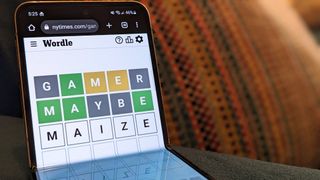Like many websites, we publish a daily hint and answer for Wordle (opens in new tab). We do this because every single day Wordle players search for a hint and answer to that day's Wordle puzzle. To be blunt about it: a lot of people cheat at Wordle.
But I don't think people cheat just so they don't have to do the puzzle themselves—what would even be the point of playing Wordle every day if you were just going to look up the answer? I'm pretty sure that when people cheat at Wordle it's just to maintain their streaks. Wordle keeps track of how many times you've played, what percentage of games you've won, along with your current streak. If you miss one, that streak is reset to zero, which can be a pretty big blow if you're gone for weeks or even months without missing a single word.
So, I get it. You're down to your final guess, and the grid is showing one of those bastard words like CA_ER, which could be CAPER or CABER or CATER or maybe ever CAGER. Your 71-day streak is on the line. Screw it! You take a little peek at the answer, and you don't have to suffer the indignity of starting your streak over from nil.
At the Game Developers Conference in San Francisco this week, Zoe Bell, Executive Producer of New York Times Games, talked about the NYT's first year of Wordle, which the paper acquired from creator Josh Wardle (opens in new tab) for a seven-figure sum in January of 2022. During her talk, Bell revealed what the toughest Wordle word has been to date.
It was PARER.
On average, every day about 15% of players have their streaks broken. But on September 16, PARER stumped a whopping 60% of players. I can see why: it's definitely one of those words, which Bell called a "skyscraper word" where the grid winds up looking like tall buildings with a gap between them (people probably guessed PAGER or PALER or PAPER). Plus, it has a letter that's used twice, which is always extra tricky in Wordle.
And who the hell even says parer? I think probably everyone calls it a paring knife. I don't remember if I lost Wordle that day, but I'm guessing I did.
Words like parer are probably one of the reasons people have accused Wordle of getting harder after the NYT acquisition, though in her GDC talk Bell confirmed the paper did not make the game more difficult. Some of the "less family friendly" words from Josh Wardle's original list were removed (like LYNCH, WENCH, and SLAVE) but the NYT is still using Wardle's original list of 2,300 words. It is curating those words now, after appointing a Wordle editor in October, but hasn't done anything to make the daily puzzle harder.
Bell stressed NYT's philosophy of "do no harm" when it came to acquiring Wordle: not tampering with the game's formula or changing its looks—apart from the title's font and the addition of a few links on Wordle's results page—and keeping it free to play. It seems to have worked: Bell says that in July, when Wordle began tracking player stats across all browsers and devices, Wordle became the largest driver of NYT registrations across the United States for several days.
Wordle has also led to a rise in paid subscriptions to the New York Times' collection of games, which includes their crossword puzzle, a mini crossword, and another word game, Spelling Bee. In fact, in 2022, Bell says 35% of people who subscribed to NYT games did so specifically because of Wordle—even though you don't need to subscribe to play it. Wordle is still free, but it sounds like it's paying off.

